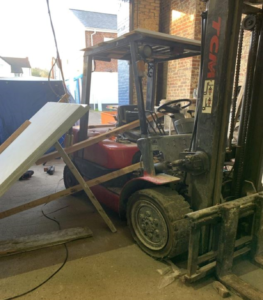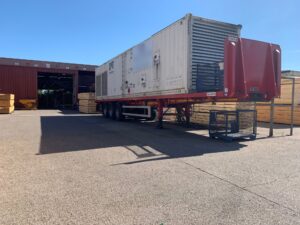Company and director sentenced after employee crushed to death
A company and its director have been sentenced following the death of an employee.
Robert Czachracz was crushed by two granite slabs while working for West Midlands firm Graniteland Limited on 30 November 2020.
The 46-year-old, who was from Poland, had been unpacking and moving the slabs onto storage racks, using an overhead crane, at the company’s Lyde Green site in Halesowen.
Two of the slabs, each weighing 250kg, fell and crushed Mr Czachracz against a forklift truck while he was operating the crane’s handheld pendant control.

He died at the scene despite desperate attempts from bystanders at nearby businesses and the emergency services to save him.
A Health and Safety Executive (HSE) investigation found Graniteland Limited and its director, Mr Shu Lai Li, failed to implement staff training or develop safe systems of work for the unloading, loading and handling of concrete slabs. There was no evidence that employees had received training in the safe operation of machinery, including the overhead crane. The overhead crane and forklift truck had also not been thoroughly examined, as required by law, and that webbing slings, that could have been used during the unpacking process, were damaged.
HSE guidance states employers must manage and control the risks to avoid any injury or damage during lifting operations. More on this can be found at: Lifting Operations and Lifting Equipment Regulations (LOLER) (hse.gov.uk)
Graniteland Limited, of Lyde Green, Halesowen, pleaded guilty to breaching Section 2(1) of the Health and Safety at Work etc. Act 1974. The company was fined £18,000 and ordered to pay £4,196.03 in costs at Dudley Magistrates’ Court on 6 March 2024.
Mr Shu Lai Li, of Lyde Green, Halesowen, pleaded guilty to breaching Section 37(1) of the Health and Safety at Work etc. Act 1974. He was ordered to complete 120 hours of unpaid work and pay £4,043.42 in costs at Dudley Magistrates’ Court on 6 March 2024.
HSE inspector Mahesh Mahey said: “This was an entirely preventable accident. The risks of lifting and moving granite slabs were obvious, yet could have been controlled by relatively simple and inexpensive measures. The company and director failed to adequately control lifting operations which resulted in an employee needlessly and tragically losing his life.”
This prosecution was brought by HSE enforcement lawyer Andy Siddall and supported by HSE paralegal officer Rebecca Forman.
Notes to editors:
- The Health and Safety Executive (HSE) is Britain’s national regulator for workplace health and safety. We prevent work-related death, injury and ill health through regulatory actions that range from influencing behaviours across whole industry sectors through to targeted interventions on individual businesses. These activities are supported by globally recognised scientific expertise.
- More information about the legislation referred to in this case is available.
- Further details on the latest HSE news releases is available.
